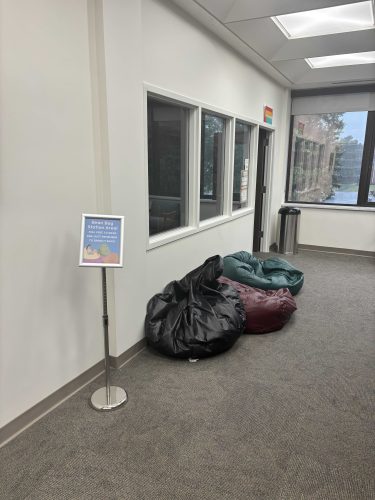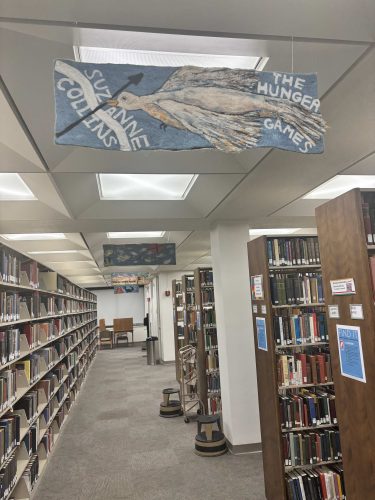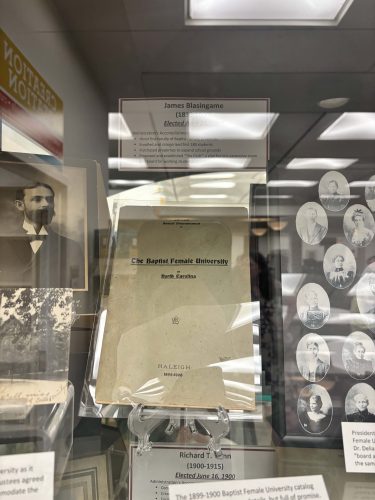On August 6, I represented ZSR at the North Carolina Independent Colleges and Universities (NCICU) Library Resources Group Meeting at the Carlyle Campbell Library at Meredith College in Raleigh. This group comprises institutions from across the state, and at this particular meeting there were folks from as far west as Mars Hill University and as far east as Mid-Atlantic Christian University (the newest member of NCICU) in Elizabeth City.
We were welcomed by Carrie Nichols, Co-Dean of the library, and Jack Vaccaro, Research & Instruction Librarian. Claire Leverett from NCLIVE then gave us an update on the resource selection process, which they are currently working on for the 2027-2029 cycle. She shared about their selection criteria and outlined the roles that various groups play in the process. She also shared that they are working on updating their usage stats portal to make it more useful for pulling information on your own library as well as comparing to peers.
We then moved into a open forum where we could share challenges and crowdsource ideas. Not surprisingly, one of the common challenges was how to deal with a flat or negative budget. Some of the creative ways people are addressing it include reviewing journal stats for high cost-per-use titles and trying to determine whether the title is still needed, using accreditation needs to get budget increases, and using DOCLINE for articles from the National Library of Medicine. We were reminded that the State Library offers online access to both the Raleigh News & Observer and Charlotte Observer and that all NC residents can get a State Library card online to access these for free! We also talked about ways to market resources so that they get more usage, and some folks shared how they are working with faculty to integrate specific resources into their assignments and courses. There was also discussion of a potential lesson plan bank for NCLIVE resources – hopefully more to come on that in the future!
After lunch, we reconvened for another roundtable discussion led by Steve Bahnaman, Dean of the Library at Campbell University. Our topic this time was AI tools within library databases. We scoped the conversation to just the tools that are in our licensed resources. We had a lively discussion but still ended up with a lot more questions than answers:
- What feedback are we giving to vendors to improve their products? What is going to elevate a tool from a C grade to an A?
- The ability to turn the AI tool on/off at the individual user level (rather than the admin level)
- Provide a test environment instead of having to turn the tool on for the entire user group to test it
- There are significant issues around transparency, both in how the tool came up with the results that it did, as well as what it may be missing. For example, we discussed the issue of some tools not returning results for queries on “controversial” topics.
- We have to keep providing feedback to vendors or nothing will change, and it’s more powerful when we can advocate as a group (through NCICU, Carolina Consortium, NCLIVE, etc.)
- Do we still want Boolean to be the way people are thinking about search in 2035? Or do we need to get to a words/concept level like natural language?
- Although there are some natural language tools (like EBSCO’s new one), the infrastructure of the databases is still built on Boolean.
- How do we embed critical thinking into these tools? How do we tell them to “show their work”?
- Summarization tools should tell you what they’re looking at to create the summary
- Re: usefulness of summaries — Tension between humanities vs sciences and social sciences
- Would there be some value in discipline-specific AI tools?
- Big question: Can AI read human output accurately?
- Who makes the decisions about what to turn on/off and what to limit access to?
- At some places, this is being done at the larger administrative level, while at others, it’s up to the person who activates the resources.
- To what extent does enabling these tools become an endorsement of them?
- Some felt that we have a ethical obligation to teach students how to use these tools ethically and to the best of their advantage.
Kate Silton and I are hosting a lively discussion at Charleston around this same topic, so it was really useful for me to hear what kinds of questions folks have and their concerns and approaches around AI in library resources.
After the official meeting ended, we got a tour of the library (always one of the perks of these meetings!) Although it’s a small library, they’ve really made it welcoming for students, with bean bag chairs that can be moved around the space, student artwork throughout, and even a “relaxation room” with soft lighting, sound machines, and comfortable seating options. (The light was too low to get a good picture!)


I also did not realize until I saw an exhibit about it in the library that Meredith was founded as the Baptist Female University by the Southern Baptist Convention in 1899 and broke ties with the SBC about a decade after WFU did.

Although this was my first time attending this particular meeting, I still found some familiar faces in the group and made some connections with others (mostly talking about how wonderful my ZSR colleagues are!). Despite the rainy drive both ways, it was great to see and hear from other academic library folks across North Carolina, and I hope to have more opportunities like this in the future!

5 Comments on ‘Kathy @ NCICU Library Resources Group Meeting’
Kathy, thanks for this report on the NCICU Library Resources Group Meeting! This is a great list of questions!
I’m hoping your lively discussion at Charleston is not in the same slot as mine so I can go and listen in! Great summary and thanks for representing ZSR at this.
Thanks for this report, Kathy! I had no idea anyone could get a state library card online, and the discussions and tour look so informative!
Kathy, I believe you were just the right person to represent ZSR with the range of topics at this meeting. I’m especially glad it can help your Charleston discussion! Thanks so much for the detailed report!
I’m so glad you attended this conference! The questions that surfaced from the discussion on AI tools in library databases were particularly interesting.